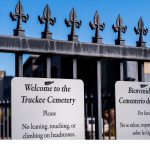Dear Therapist: My Sister Has OCD, How Do I Help?

Dear Therapist: My sister recently had her first baby, which is exciting, but has been struggling with postpartum OCD, diagnosed by her doctor. I’m confused by what I’ve seen online about OCD and sort of freaked out by the descriptions. Also, my sister is scared to get help because she says that treatment for OCD is exposing yourself to your worst fears and she does not want to be forced to do things like leave the baby alone. How do I help her?
Dear Supportive Sister: I am sorry your sister is struggling but really glad her doctor recognized the OCD. I’m not surprised you’re confused by what you’ve read online. Depictions of Obsessive Compulsive Disorder are sometimes just wrong – OCD is not about being super organized, or portray OCD in stereotypes that fail to reflect the wide range of OCD or explain why a person is behaving that way.
OCD is a pattern that emerges from a person’s need to feel at ease amidst the uncertainty of life, rather than unsettled, scared, ‘off’ or agitated. While we all have this need, some people develop a brain pattern that seeks this sense of ease by hyperfocusing on specific things that the brain has identified as ‘off’ or unsettling, and then trying to make them ‘right’ and ‘settled’.
The hyperfocus could be on a scary thought or idea like ‘what if I sit on the baby and kill her?’, an upcoming or past decision like ‘what if I make the wrong choice about my job and regret it forever?’, or ‘did I marry the wrong person?’, an ‘off’ feeling in the body, a health issue, or something off or potentially threatening in their environment. That’s the obsession.
When the brain latches on to this thing and tries to fix, neutralize, solve, or make it right, that’s the compulsion. It could be anything from googling more and more information, continually seeking reassurance, avoiding situations, repeating certain behaviors, thinking about the thing over and over, or constantly beating oneself up over the thing.
The OCD pattern of seeking ease sadly backfires. First of all, it creates a feedback loop of extreme over-indexing on this one thing. The more a person focuses on trying to fix or solve it, the more their brain believes that this thing is a serious threat that must be neutralized. It begins to feel increasingly dangerous and irresponsible to not fixate and solve, and the person becomes trapped on a hamster wheel of obsession and compulsion.
Secondly, it is an endless loop that only creates more distress and fear. Trying to get things in life to be ‘right’ or ‘settled’ is a losing battle. Life is uncertain and we can’t eliminate uncertainty. And so the more the person runs the loop, the more they fail to feel better, the more helpless and unsettled and scared they become, the more crazy and isolated they feel, the more they feel compelled to run the loop.
As a supportive sister, please let your sister know that these fixations and loops don’t mean that she’s weird or bad or crazy. Please let her know that the hormonal changes and new responsibilities of the postpartum phase are a perfect storm for activating OCD. Please let her
know that therapy for OCD can be very effective and that therapy should never be about being forced to do anything – the entire point is to give a sense of choice and self-trust back to the person who feels trapped in OCD.
For you, supportive sister, please know that OCD isn’t anything to be freaked out about. No one has perfected the art of navigating the uncertainty of life, always knowing when we need to take control and when we need to let go, or managing the felt experience of not being in control and having to just feel scared and unsure. We all have suboptimal ways of handling these conundrums. We can, however, show up for one another with compassion and grace, and face life – the good parts and the scary parts – together.
Danielle B. Grossman, Licensed Marriage and Family Therapist, has worked with clients in the Truckee/Tahoe community for over 20 years. She helps individuals and couples with their relationships, anxiety, grief, and struggles with food and addiction. Reach out at truckeecounseling@gmail.com or learn more at truckeecounseling.com
Support Local Journalism


Support Local Journalism
Readers around Lake Tahoe, Truckee, and beyond make the Sierra Sun's work possible. Your financial contribution supports our efforts to deliver quality, locally relevant journalism.
Now more than ever, your support is critical to help us keep our community informed about the evolving coronavirus pandemic and the impact it is having locally. Every contribution, however large or small, will make a difference.
Your donation will help us continue to cover COVID-19 and our other vital local news.









